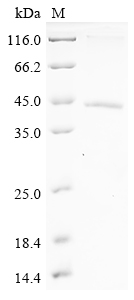Recombinant Human Secreted frizzled-related protein 2 (SFRP2) , partial
CAT:
399-CSB-EP021139HU1-01
Size:
1 mg
Price:
Ask
- Availability: 24/48H Stock Items & 2 to 6 Weeks non Stock Items.
- Dry Ice Shipment: No




Recombinant Human Secreted frizzled-related protein 2 (SFRP2) , partial
- CAS Number: 9000-83-3
- Gene Name: SFRP2
- UniProt: Q96HF1
- Expression Region: 68-186aa
- Organism: Homo sapiens
- Target Sequence: TMKEVLEQAGAWIPLVMKQCHPDTKKFLCSLFAPVCLDDLDETIQPCHSLCVQVKDRCAPVMSAFGFPWPDMLECDRFPQDNDLCIPLASSDHLLPATEEAPKVCEACKNKNDDDNDIM
- Tag: N-terminal 6xHis-GST-tagged
- Source: E.coli
- Field of Research: Cancer
- Assay Type: Developed Protein
- Relevance: Soluble frizzled-related proteins (sFRPS) function as modulators of Wnt signaling through direct interaction with Wnts. They have a role in regulating cell growth and differentiation in specific cell types. SFRP2 may be important for eye retinal development and for myogenesis.
- Purity: Greater than 90% as determined by SDS-PAGE.
- Activity: Not Test
- Length: Partial
- Form: Liquid or Lyophilized powder
- Buffer: If the delivery form is liquid, the default storage buffer is Tris/PBS-based buffer, 5%-50% glycerol. If the delivery form is lyophilized powder, the buffer before lyophilization is Tris/PBS-based buffer, 6% Trehalose, pH 8.0.
- Reconstitution: We recommend that this vial be briefly centrifuged prior to opening to bring the contents to the bottom. Please reconstitute protein in deionized sterile water to a concentration of 0.1-1.0 mg/mL.We recommend to add 5-50% of glycerol (final concentration) and aliquot for long-term storage at -20℃/-80℃. Our default final concentration of glycerol is 50%. Customers could use it as reference.
- Molecular Weight: 44.9 kDa
- References & Citations: "Autocrine/paracrine secreted Frizzled-related protein 2 induces cellular resistance to apoptosis: a possible mechanism of mammary tumorigenesis." Lee J.L., Lin C.T., Chueh L.L., Chang C.J. J Biol Chem 279:14602-14609 (2004)
- Storage Conditions: The shelf life is related to many factors, storage state, buffer ingredients, storage temperature and the stability of the protein itself. Generally, the shelf life of liquid form is 6 months at -20℃/-80℃. The shelf life of lyophilized form is 12 months at -20℃/-80℃.
